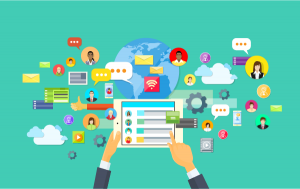- What is digital citizenship?
OR, it is a holistic and positive approach to helping students learn how to be safe and secure, as well as smart and effective participants in a digital world.
- 9 elements of digital citizenship

- Digital access
- Digital commerce
Technology users need to understand that a large share of the market economy is done electronically. Full electronic participation in society, which includes helping to make sure everyone has equal access to technology and understands the limitations and drawbacks when this access is withheld. Legitimate and legal exchanges occur but the buyer and seller need to be aware of the issues associated with it. Users need to learn about how to be effective consumers of the digital economy.
- Digital communication
Examples: mobile phones, television, radio, Internet. CDs and MP3s are replacing records and tapes, digital cameras, etc...
- Digital literacy
- Digital etiquette
Technology users often see this area as one of the most pressuring problems when dealing with digital citizenship. More than just being able to recognize inappropriate behavior, good digital citizens should know how to act appropriately online. Inappropriate behavior is recognized but before people use the technology they do not learn digital citizen etiquette.
- Digital law
There are certain rules of society that users need to be aware of an ethical society. Users need to understand that stealing or causing damage to others identity or property online is a crime. Hacking into others information, creating destructive worms, plagiarising, downloading illegal music, viruses, sending spam or stealing anyone's identity or property is unethical.
- Digital right and responsibilities
- Digital health and wellness
- Digital security
In a society
there are people who steal, disrupt or deface other people, the same thing goes
for the digital community. There needs to be virus protection, backups of data
and surge control of equipment. As a responsible citizen, you must
protect your information from outside forces that may cause disruption or harm. It is important to ensure that your devices are safe and secure to use.
Digital Security is important because it allows people to use social media and online banking and protects them from risks such as identity theft and fraud.
Cyberbullying

Cyberbullying is like any other bullying which takes place online. It comes in many forms like spreading rumors and sending threatening messages through social media, texting, or email, pretending to be another child and posting embarrassing material under their name, forwarding private photos without consent, and generally posted online about another child with the intent to humiliate them.

1. Why cyberbullying is dangerous?
Cyberbullying can be dangerous because it can lead to:
- depression
- fear and anxiety
- low self-esteem
We can prevent cyberbullying by:
- keeping a record of everything
- saving emails and
- taking screen captures of the offending online posts or text messages
- blocking the person doing the bullying


No comments:
Post a Comment